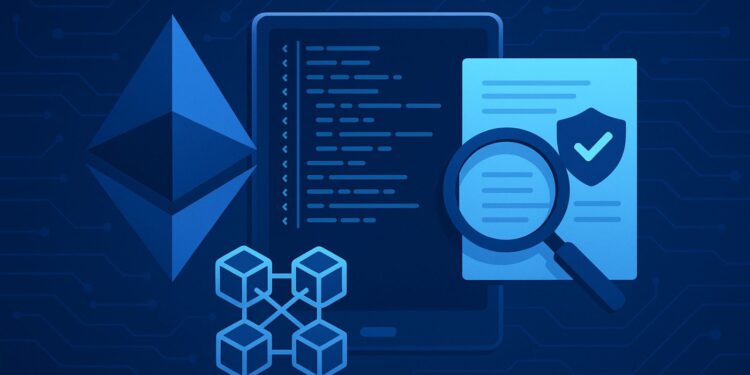When you’re building on the blockchain, every line of Solidity code can make or break your project. To keep everything secure, a Solidity audit acts as your smart contract’s gateway to trust and reliability.
In this guide, we’ll walk you through everything you need to know about Solidity audits, i.e., how to prep your codebase, decode your audit report, and turn that feedback into bulletproof contracts.
Preparing Your Solidity Codebase for Audit
Before you even think about sending your smart contracts off for a Solidity audit, you’ve got to do a little housecleaning.
1. Polish That Code
No auditor wants to wade through messy, disorganized code. Tidy it up!
Use consistent naming conventions and make sure everything’s properly indented and spaced. Add comments—lots of them. Your future self (and your auditors) will thank you.
2. Document Everything
Think of your documentation as a roadmap. It helps auditors get up to speed quickly on your project’s purpose, logic, and dependencies.
A well-documented codebase can make a big difference when auditors start digging in.
3. Test Coverage Is Your Superpower
Auditors love tests, be they unit tests, integration tests, you name it.
Good test coverage shows that you care about quality. Plus, it helps auditors understand how your contracts are supposed to behave, making it easier to spot problems.
4. Freeze the Codebase
Once you’re ready for the audit, stop writing new features. A moving target is a nightmare for security reviews.
Create a code freeze so everyone’s on the same page and your auditors can focus on a stable version.
Defining Scope: The Critical First Step in Any Audit
Before kicking off a Solidity audit, it’s vital to define exactly what the auditors should review and what risks matter most.
A well-defined scope ensures both your team and the auditors are aligned. It also prevents misunderstandings and helps the auditors deliver the most valuable insights.
Here’s what to clarify:
1. Which Contracts Are In Scope?
List every smart contract and dependency you want audited. Be explicit, especially if you’re using third-party contracts, proxies, or upgradeable patterns.
- Are all contracts deployed on-chain?
- Are there libraries involved?
- Are there governance or admin contracts?
- Are there external interfaces?
If certain contracts are out of scope, document that too.
2. What Type of Risks Matter Most?
Different projects face different threat profiles. Help your auditors prioritize by discussing your risk priorities:
- Are you handling large user funds?
- Are flash-loan attacks a major concern?
- Is front-running an issue (e.g., in DEX logic)?
- Do you rely on oracles that could be manipulated?
- Are you using novel patterns (e.g., DeFi primitives, upgradable proxies)?
Defining these priorities helps auditors focus on the most impactful risks.
3. What Assumptions Should Auditors Know?
Clarify key assumptions so auditors understand your system in context:
- Which users or roles are trusted?
- Is external input expected to be adversarial?
- Are there known limitations or trade-offs in your design?
Good assumptions prevent wasted effort and help auditors find real-world risks that matter to your users.
Final tip: Document your scope and share it with your auditors before they begin. This ensures clarity, saves time, and leads to a much higher quality audit outcome.
Common Tools and Methodologies in Solidity Auditing
A Solidity audit comprises human eyes on your code, though it’s not just about that; it’s also about leveraging powerful tools and proven techniques to catch bugs and vulnerabilities.
1. Static Analysis: Your First Line of Defense
Static analysis tools scan your code for known issues before anything gets deployed. They catch common problems like reentrancy attacks, integer overflows, and access control mishaps. Some top tools include:
- Slither: A static analysis powerhouse that flags known vulnerabilities fast;
- Mythril: Uses symbolic execution to find tricky bugs lurking in your logic.
2. Dynamic Analysis and Fuzzing: Breaking Things on Purpose
Dynamic analysis goes beyond static scanning. It runs your contracts in a controlled environment to see how they react to weird inputs or edge cases.
Fuzzing tools like Echidna throw random data at your contracts to find those “what if” scenarios you never thought about.
3. Manual Code Review: Human Ingenuity at Work
Automated tools are great, but they’re not perfect. That’s where experienced auditors step in.
They dive deep, looking for complex logic errors, unusual edge cases, and anything the automated tools might have missed.
Interpreting Audit Reports Effectively
Once your Solidity audit is done, you’ll get an audit report, though reading it isn’t always as straightforward as you’d like. Allow us to explain:
1. Severity Matters
Audit reports usually rank findings by severity:
- Critical: These are the “oh no” issues that can cause real damage. Fix them ASAP!
- High: Serious problems that could be exploited in the right conditions;
- Medium: Still important but not immediately life-threatening;
- Low: Usually best practices or minor optimizations.
Understanding these rankings helps you prioritize what to tackle first.
2. Recommendations: The Auditor’s To-Do List
Each finding should come with a clear fix or suggestion for improvement. Don’t ignore them, because they’re your roadmap to a safer, stronger smart contract.

Incorporating Audit Feedback into Your Development Cycle
Now that you’ve got your audit report, it’s time to put it to work.
1. Fix What’s Broken, And Fast
Start with the critical issues and work your way down. This isn’t the time to be cheap, as every fix matters.
2. Test Again
Don’t just patch things and move on. Go ahead and rerun your tests to make sure everything still works as intended. Bugs love to hide in the cracks.
3. Re-Audit if Needed
If you’ve made significant changes, consider another audit pass. Better to be safe than sorry, especially if you’re about to launch to the mainnet.
4. Make Security Part of Your Culture
A Solidity audit shouldn’t be a one-time thing, so build security reviews into your dev cycle.
Use static analysis tools regularly, monitor best practices, and stay updated on the latest exploits. Security is an ongoing priority, not a one-and-done pit stop.
Conclusion
More than a technical toolbox, a Solidity audit translates as your commitment to building secure, reliable, and trustworthy smart contracts.
If you prepare your codebase properly, leverage the right tools, understand your audit report, and turn that feedback into action, you’re not just reducing risk but creating a safer, stronger foundation for your blockchain project.






















































